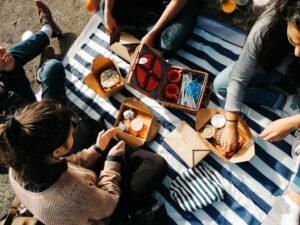In our quest for a more sustainable and environmentally conscious world, the impact of choices, even as seemingly small as the tableware we use, plays a significant role. This blog delves into the social implications of adopting eco-friendly tableware and how it aligns with key Sustainable Development Goals (SDGs).
Reducing Plastic Pollution
Eco-friendly tableware, often crafted from biodegradable materials like bamboo or sugarcane, contributes to reducing plastic pollution. As traditional single-use plastics pose a severe threat to our ecosystems, the adoption of eco-friendly alternatives becomes a tangible step towards achieving SDG 14 (Life Below Water) and SDG 15 (Life on Land), focusing on the conservation of oceans and terrestrial ecosystems.
Promoting Responsible Consumption and Production
The production and consumption of eco-friendly tableware support SDG 12 (Responsible Consumption and Production). By choosing materials like recycled plastic or sustainable bamboo, individuals and businesses actively contribute to minimizing waste and encouraging more sustainable manufacturing practices.
Supporting Decent Work and Economic Growth
The eco-friendly tableware industry fosters employment opportunities, especially in regions where materials like bamboo or palm leaves are abundant. This aligns with SDG 8 (Decent Work and Economic Growth), promoting inclusive economic growth and providing fair employment conditions.
Ensuring Health and Well-being
The materials used in eco-friendly tableware, such as cornstarch or wheat straw, are often free from harmful chemicals found in traditional plastics. This supports SDG 3 (Good Health and Well-being) by promoting safer alternatives for both consumers and the environment.
Community Engagement and Education
The adoption of eco-friendly tableware encourages community engagement and education, contributing to SDG 4 (Quality Education). By raising awareness about the environmental impact of tableware choices, individuals and communities can make informed decisions that align with sustainable practices.
Combatting Climate Change
Eco-friendly tableware made from sustainable materials aids in mitigating climate change, supporting SDG 13 (Climate Action). Choosing materials with lower carbon footprints, such as bamboo or recycled plastics, helps reduce greenhouse gas emissions and promotes a more sustainable future.
Global Partnerships for Sustainable Development
The widespread adoption of eco-friendly tableware fosters global partnerships, aligning with SDG 17 (Partnerships for the Goals). Businesses, governments, and individuals working together to promote sustainable practices in the tableware industry contribute to the overarching goal of creating a more sustainable and interconnected world.
In conclusion, the societal impact of eco-friendly tableware extends beyond the dining table, resonating with key Sustainable Development Goals. By making conscious choices in tableware, individuals and businesses alike can actively contribute to a more sustainable and socially responsible global community.






